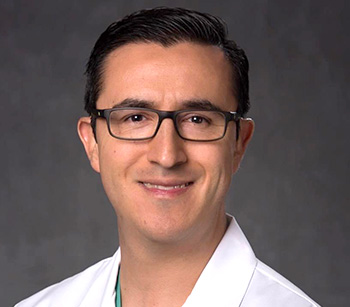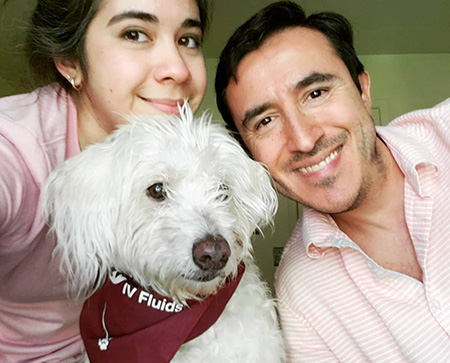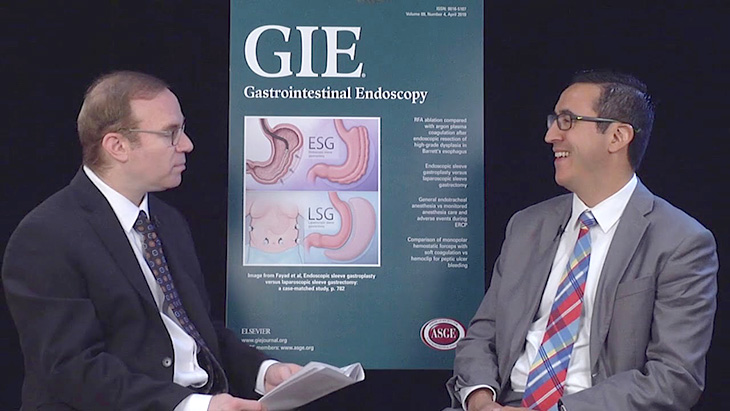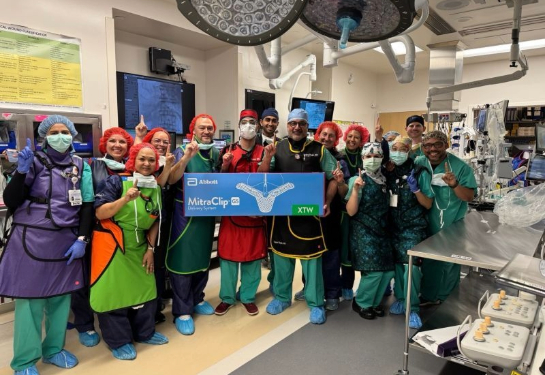Meet Antonio Mendoza-Ladd, UC Davis Health’s new medical director of endoscopy
Earlier this month, UC Davis Health welcomed Antonio Mendoza-Ladd as medical director of endoscopy in the Division of Gastroenterology and Hepatology.

He will lead a new center focused on interventional endoscopy within the Department of Internal Medicine. It will operate out of a new leading-edge endoscopy suite that opened last year at UC Davis Medical Center.
Throughout his career, Mendoza-Ladd has pioneered interventional endoscopy, including performing groundbreaking gastric and endoscopic surgical procedures. He joins UC Davis Health from the University of New Mexico Health Sciences Center, where he developed the third space endoscopy program and served as medical director of endoscopy.
Mendoza-Ladd’s path to medicine began in his native Guatemala where an aptitude test in high school suggested he would make a good a veterinarian, dentist or physician. He entered medical school immediately after high school, as students do in Guatemala.
Mendoza-Ladd and his wife drove to Sacramento from New Mexico with their three dogs, rabbit and cat amidst the heavy storms that hit the state in late January. He recently talked with us about his career experience, interests and goals for the division and its patients.
Why did you decide to come to UC Davis Health?

I was looking for a different, collaborative environment that fit my career goals. I spoke with Christopher Bowlus — chief of the Division of Gastroenterology and Hepatology — on the plans for developing a new center for interventional endoscopy within the Division of Gastroenterology and Hepatology. After we spoke, I felt that this was an ideal opportunity to develop the program from the ground up, train people and bring my expertise on interventional endoscopy to the region. It was simultaneously a great opportunity and a great challenge to take on — in addition to being in a state with great weather.
What is your first goal at UC Davis Health?
My main goal is to successfully develop the center for interventional endoscopy. I want to bring the expertise of interventional endoscopy to patients in Sacramento and the region so that they don't have to drive long distances to get these procedures. Until recently, that was the only option to get this type of care.
Why are you committed to interventional endoscopy?
It’s very rewarding. You can treat patients for a variety of disorders like gastrointestinal bleeding or intervene in the early stages of gastrointestinal cancer, which includes the colon, the esophagus and the stomach. The field of endoscopy has grown so much, and there are a variety of treatments we can offer to improve the patient experience. We can inject medicine, including chemotherapy, through the endoscope. We can also biopsy tumors and remove polyps as well as other interventions that used to require more complex surgeries.
By establishing this center, we are offering a broad repertoire of new procedures for our patients. We know that there is a definite need for these services in this area. We plan to bring cutting-edge, minimally invasive procedures to the region, keeping patients from painful, costly and more invasive procedures. This will require collaboration across various departments including endoscopists, surgeons, oncologic surgeons, radiologists, oncologists, radiation oncologists, pathologists, primary care doctors and pediatricians, among others. Some of the new procedures we are bringing to the area include:
- Endoscopic treatment for Achalasia, Gastroparesis and Zenker’s diverticulum
- Locating and removing large precancerous and early-stage cancerous tumors in the colon, esophagus, stomach and duodenum
- Non-surgical treatment for gallbladder problems and gallstones and obstructions from GI cancers and other conditions
We are also teaching and training young interventional endoscopists and creating a rich environment for new research opportunities. To be clear, we have already started performing interventional endoscopy procedures. My role is to ensure we build a more robust program that will be able to care for more patients over time.

How did your experiences influence your career path?
I was not one of those people who knew they wanted to be a doctor from a young age. Though I became interested in it as a career because I enjoyed science, math, chemistry and other similar subjects.
I entered medical school in 1999. Internal medicine was the field that appealed to me most, and I went on to do my residency in internal medicine. While I had initially considered cardiology, I changed my mind in my first year of residency. Instead, I decided to pursue gastroenterology which appealed to me because it was very direct. There’s a problem, I go in and fix it. There are direct objectives that you can go in and address. There’s a bleeding, I go in and stop it, there’s a polyp, I go in and remove it. So, I continued my fellowship in gastroenterology, and after practicing for a couple years, I went back to school for an additional fellowship in endoscopy.
How do you feel about joining the UC Davis Health team?
I’ve felt great vibes from everyone with whom I’ve come into contact. That was one of the first things that struck me when I came for my interview, even prior to joining the team. I’m not sure if it’s UC Davis Health or California but there is a very “chill,” welcoming feeling in the atmosphere.
I feel honored that the university shows interest in the experience and knowledge I bring to the table, which has in turn made me feel very welcomed here.



